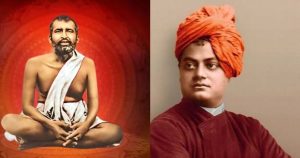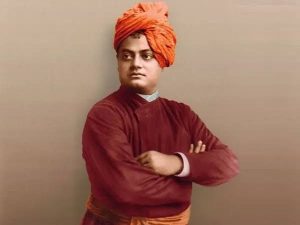Digital News Guru Education Desk:
Swami Vivekananda, born Narendra Nath Datta in 1863, is celebrated for introducing Indian philosophies like Vedanta and Yoga to the Western world and for his groundbreaking speech at the Parliament of the World’s Religions in Chicago in 1893. While his legacy as a spiritual leader, philosopher, and thinker is well-documented, there are many intriguing and lesser-known facts about his life that continue to inspire millions.
- Childhood Genius and Curiosity
From a young age, Narendra Nath (later Swami Vivekananda) displayed remarkable intelligence and curiosity. He had an extraordinary memory and a penchant for absorbing vast amounts of knowledge. He read a wide range of subjects, including Western philosophy, history, social sciences, and literature. Additionally, he could memorize entire texts after just one reading, a skill that amazed many of his peers. Even as a child, he questioned everything and sought logical answers, showcasing the keen analytical mind that would define his later teachings.
- Deep Interest in Science and Rationality
Although Vivekananda is often celebrated for his spiritual contributions, he had a profound interest in science. He believed that spirituality and science could coexist and advocated for a scientific approach to understanding religion. He was well-versed in scientific concepts, including physics and biology, and emphasized that Vedanta could provide a spiritual foundation for scientific inquiry. He once said, “Science and religion will meet and shake hands.” This belief in unifying different aspects of human understanding made him a unique voice among spiritual leaders of his time.
- Impact of Ramakrishna on His Life
Vivekananda’s spiritual journey was profoundly shaped by his guru, Ramakrishna Paramahamsa. Initially a skeptic, Vivekananda challenged Ramakrishna with several questions about God and spirituality. It was only after Ramakrishna demonstrated spiritual truths through experience that Vivekananda became his disciple. Ramakrishna’s teachings emphasized that all religions lead to the same divine reality, an idea that deeply influenced Vivekananda’s message of religious harmony.

- The Chicago Speech Almost Didn’t Happen
One of the most famous events of Swami Vivekananda’s life was his speech at the Parliament of the World’s Religions in Chicago on September 11, 1893. However, what many do not know is that his journey to the United States was fraught with difficulties. He arrived in America without sufficient financial support or an invitation to the conference. It was through the assistance of friends and well-wishers, particularly in Boston, that he finally made it to Chicago. His opening words, “Sisters and Brothers of America,” earned him a standing ovation, and his speech left an indelible mark on the audience.
- Interest in Western Culture and Literature
Swami Vivekananda was deeply interested in Western culture and was influenced by various Western thinkers. He read works by Shakespeare, John Stuart Mill, and David Hume and had a good grasp of European history. His knowledge of Western literature and philosophy helped him effectively communicate the spiritual teachings of the East to Western audiences. He was able to present complex Indian philosophies in a way that was understandable and appealing, making them accessible to people unfamiliar with Hinduism or Vedanta.
- Prophetic Insights and Predictions
Swami Vivekananda had an uncanny ability to make accurate predictions. One of his most famous forecasts was about his own death. He predicted that he would not live beyond the age of forty, a prophecy that came true. He passed away on July 4, 1902, at the young age of 39. His spiritual followers believe that he attained mahasamadhi, the ultimate meditative state, consciously leaving his physical body.

- Promoter of Physical Fitness and Yoga
While Swami Vivekananda is widely known for his spiritual teachings, he was also a strong advocate of physical fitness. He emphasized the importance of a healthy body, often stating that physical strength was essential for spiritual growth. He encouraged practicing yoga and physical exercises, believing that a sound body contributed to a sound mind. He once remarked, “You will be nearer to Heaven through football than through the study of the Gita,” indicating that physical strength and vigor were foundational to living a purposeful life.
- Pioneering Work in Social Reform
Vivekananda was not just a spiritual leader but also a social reformer who actively worked to uplift society. He emphasized the need to eliminate social evils such as caste discrimination and gender inequality. His teachings promoted the idea of service to humanity as service to God, inspiring the establishment of the Ramakrishna Mission in 1897. The mission focuses on education, healthcare, and disaster relief, embodying his vision of a society built on compassion and equality.
- Master of Many Languages
Vivekananda was a linguist who spoke several languages fluently, including Bengali, Hindi, English, and Sanskrit. His command over these languages allowed him to study religious scriptures in their original forms and communicate effectively with people from different cultural backgrounds. His eloquence and mastery of English played a significant role in making his speeches and teachings impactful, particularly in the West.
- Love for Music and Art
Swami Vivekananda had a great appreciation for music and the arts. He was trained in classical Indian music and often sang devotional songs. Music was an integral part of his spiritual practice, and he used it to express his devotion and inspire others. His love for art and culture also extended to his vision of a well-rounded society where spiritual, cultural, and artistic values coexisted.

Conclusion
Swami Vivekananda’s life is a tapestry of spiritual wisdom, intellectual rigor, and social reform. His ability to blend Eastern spirituality with Western rationality made him a transformative figure. From his deep appreciation of science to his unwavering commitment to social service, Vivekananda’s legacy is rich with lesser-known facts that continue to inspire people worldwide. His teachings remain relevant, urging humanity to find strength in unity, wisdom in diversity, and purpose in serving others.
You May Also Read: Delhi Air Pollution: Smog causes low visibility during the morning hours








